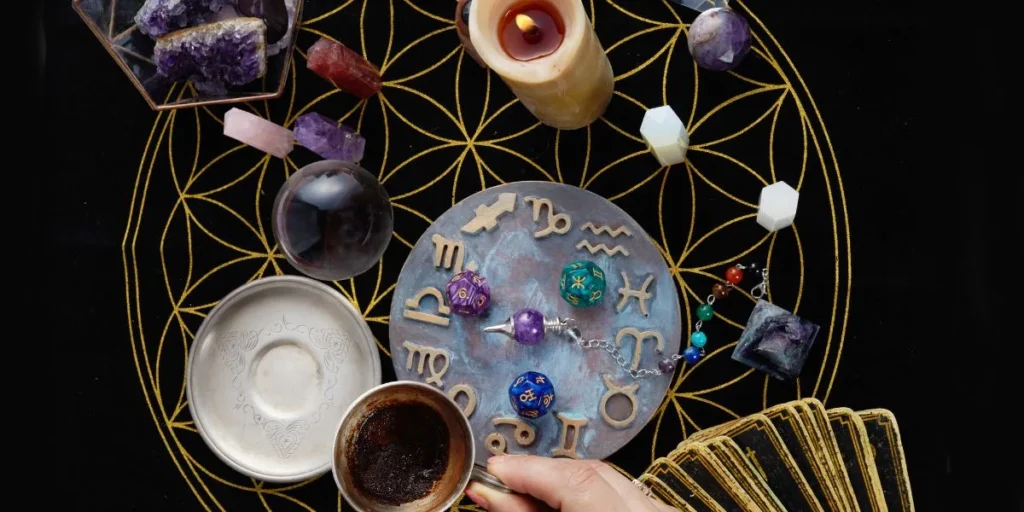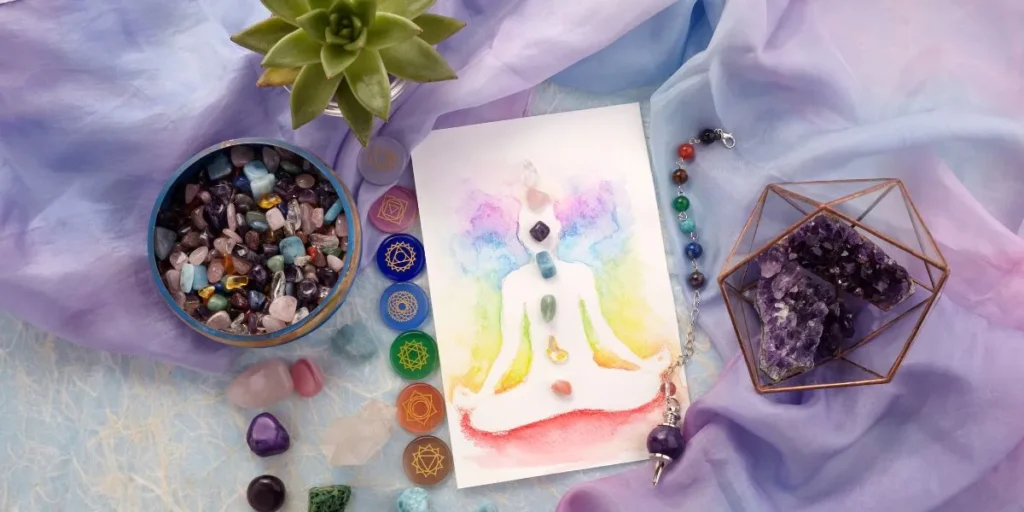
Is Reiki Witchcraft? Reiki is not witchcraft. Reiki is a form of energy healing that involves channeling universal life force energy to promote healing and well-being, whereas witchcraft involves rituals, spells, and the manipulation of natural elements. While both utilize energy, their practices, principles, and intents are distinct.
Understanding Reiki
What is Reiki?
- Reiki is a Japanese technique for stress reduction and relaxation that also promotes healing. It is based on the idea that an unseen “life force energy” flows through us and is what causes us to be alive. If one’s life force energy is low, then we are more likely to get sick or feel stress, and if it is high, we are more capable of being happy and healthy.
For more detailed information about Reiki practices and services, visit Reiki in Maryland.
Origins and Principles of Reiki:
- Origins:
- Developed in Japan by Dr. Mikao Usui in the early 20th century.
- Influences from ancient Tibetan Buddhism.
- Principles:
- Universal life force energy (Ki).
- Healing through hand placements and attunements.
Levels of Reiki:
- Reiki I: Introduction to Reiki energy and basic healing techniques.
- Reiki II: Use of Reiki symbols and distance healing.
- Reiki III (Master Level): Advanced techniques and the ability to attune others.
- Reiki Master Teacher: Teaching and passing on Reiki knowledge.
For those interested in learning more about Reiki sessions and training, check out guide to the levels of reiki.
Reiki Symbols and Their Meanings:
- Symbols are sacred and used to enhance the flow of energy.
- Cho Ku Rei: Power symbol.
- Sei He Ki: Emotional and mental healing.
- Hon Sha Ze Sho Nen: Distance healing.
For further reading on Reiki symbols, you can visit this source on Reiki symbols.
Reiki Practices:
- Attunement Process:
- Initiation ritual performed by a Reiki Master to enable a student to access Reiki energy.
- Important for progressing through different levels of Reiki.
- Distance Healing:
- Ability to send healing energy to individuals not physically present.
- Based on the concept that energy transcends time and space.
- Role of Reiki Practitioners:
- Practitioners act as channels for the universal life force energy.
- Ensure the energy is directed to areas where it is most needed.
Understanding Witchcraft

What is Witchcraft?
- Witchcraft involves the use of rituals, spells, and natural elements to manipulate energies for desired outcomes. It has a rich historical context and varies widely in practice and belief systems.
For more insights into how different practices compare, visit our Psychic Readings page.
Common Practices and Rituals in Witchcraft:
- Use of natural elements such as herbs, candles, crystals, and symbols.
- Rituals for protection, healing, and manifesting desires.
For more information on the history and practices of witchcraft, you can visit this article.
Differences Between Reiki and Witchcraft:
- Methodologies:
- Reiki focuses on channeling universal life force energy through hand placements and attunements.
- Witchcraft involves rituals, spells, and the use of natural elements to manipulate energy.
- Intent and Purpose:
- Reiki aims to heal and balance the body’s energy system.
- Witchcraft can have various intents, including healing, protection, and manifesting specific outcomes.
For those interested in exploring psychic and Reiki services, visit Book Now to schedule a session.
While both Reiki and witchcraft utilize energy, they are fundamentally different in their practices, principles, and intentions. Reiki is a holistic healing practice that promotes well-being through the channeling of universal life force energy, whereas witchcraft involves rituals and the manipulation of natural elements.
By understanding these distinctions, it becomes clear that Reiki is not witchcraft, but rather a unique and effective form of energy healing. For more detailed information about the distinctions and benefits of Reiki, you can visit the International Association of Reiki Professionals.
Common Misconceptions About Reiki and Witchcraft
Myth 1: Reiki is Witchcraft
- Clarifying the Differences:
- Reiki is a spiritual healing practice that focuses on channeling universal life force energy to promote healing and balance. It does not involve spells, rituals, or the manipulation of natural elements, which are typical of witchcraft. For a deeper understanding of what Reiki is, you can refer to this guide on Reiki.
- Witchcraft encompasses a variety of practices, including spellcasting, the use of herbs, and rituals intended to influence outcomes. Reiki, on the other hand, aims solely to harmonize the body’s energy for improved health and well-being.
For more detailed information about Reiki, visit our Reiki in Maryland and Reiki in Bethesda pages.
Myth 2: Reiki Practitioners are Witches
- Distinguishing Between Practitioners:
- Reiki practitioners are trained to channel healing energy through their hands, often involving formal attunement processes and certifications. They do not engage in the rituals or spellcasting associated with witchcraft. For more information, you can visit this article on the differences between Reiki and witchcraft.
Myth 3: Reiki Requires Psychic Abilities
- Understanding Reiki Training and Practice:
- Reiki does not require practitioners to have psychic abilities. Instead, it involves attunements that enable individuals to channel healing energy effectively. Anyone can learn and practice Reiki, irrespective of their psychic abilities. For more details, you can refer to this Reiki FAQ.
- Reiki training involves structured levels, from Reiki I to Master Teacher, focusing on different aspects of energy healing.
Reiki from a Psychic’s Perspective
Psychics and Reiki
- Why Psychics Support Reiki:
- Many psychics endorse Reiki because it complements their work in promoting holistic health and spiritual well-being. Reiki’s focus on balancing energy aligns with the psychic’s aim of enhancing overall harmony in their clients’ lives. For more on the role of energy in psychic healing, visit this comprehensive guide.
- Reiki can be a powerful tool in a psychic’s repertoire, providing an additional method to address physical, emotional, and spiritual issues.
For a deeper understanding of psychic services, visit our Psychic Readings and Aura Reading pages.
Reiki and Spiritual Energy
- Energy in Psychic Healing and Reiki:
- Both psychics and Reiki practitioners work with spiritual energy, but their methods and goals may differ. Psychics often focus on reading and interpreting energy to provide guidance, while Reiki practitioners channel energy to heal and balance the body. For insights on how Reiki integrates with psychic practices, explore this Reiki resource.
- For insights on how Reiki integrates with psychic practices, explore our Chakra Balancing and Aura Cleansing Analysis pages.
Similarities and Differences: Reiki and Witchcraft

Commonalities
- Use of Energy and Symbols:
- Both Reiki and witchcraft utilize energy and symbols, but their applications and intentions are distinct. Reiki symbols are used to enhance healing energy, while symbols in witchcraft often serve as focal points for spells and rituals. For more on the use of symbols in Reiki, you can visit this resource on Reiki symbols.
- The attraction to both practices often stems from a deep intuition and belief in the unseen energies that influence our lives.
Distinct Differences
- Reiki Attunement vs. Witchcraft Rituals:
- Reiki attunement involves a structured process where a Reiki Master passes the ability to channel healing energy to the student. This process is purely focused on healing.
- Witchcraft rituals can vary widely but generally involve specific actions and items aimed at manipulating natural forces to achieve a desired outcome. For more information on witchcraft practices, visit this History of Witchcraft.
- Healing Intent vs. Manipulation of Natural Forces:
- Reiki’s primary intent is to heal and balance the body’s energy system, promoting overall well-being.
- Witchcraft may have various intents, including protection, love, prosperity, or healing, achieved through rituals and spells that manipulate natural elements and energies.
For a comprehensive look at our services and to book a session, visit Book Now and Contact.
Reiki and witchcraft, while both involving the use of energy, are fundamentally different in their practices, principles, and intentions. Reiki is a holistic healing practice that aims to balance and heal, whereas witchcraft involves rituals and the manipulation of natural elements for various outcomes. Understanding these distinctions helps clarify that Reiki is not witchcraft but a distinct and beneficial form of energy healing.
For further exploration of Reiki and psychic services, visit Fells Point Psychic to learn more about how we can help you on your healing journey. For additional reading, you can check comprehensive guide on Reiki.
Personal Experiences and Testimonials
Case Studies
- Examples of Reiki Sessions and Their Outcomes:
- Reiki for Physical Healing: Clients have reported significant improvements in pain management and physical health after consistent Reiki sessions. One study found that Reiki application significantly reduced pain, anxiety, and breathing rate among patients who had undergone cesarean delivery.
- Emotional and Mental Well-being: Reiki has been effective in addressing emotional trauma, stress, and anxiety, promoting a state of relaxation and mental clarity. For more details on the benefits and applications of Reiki, visit Everyday Health.
FAQs
What is Reiki and How Does it Work?
- Explanation:
- Reiki is a form of energy healing that channels universal life force energy through the practitioner’s hands to the recipient. This process helps to balance and harmonize the body’s energy system, promoting healing on physical, emotional, mental, and spiritual levels. For a detailed overview, visit our Reiki in Maryland page.
Is Reiki a Religious Practice?
- Clarification:
- Reiki is not tied to any particular religion or belief system. It is a spiritual practice that promotes a connection between the practitioner, the recipient, and the universal life force energy. It can be practiced by individuals of any faith or those without religious beliefs. Learn more on our About page.
Can Anyone Learn Reiki?
- Overview:
- Yes, anyone can learn Reiki. It involves attunements that enhance the practitioner’s ability to channel healing energy. With dedication and practice, anyone can become a skilled Reiki practitioner, irrespective of their background or prior experience. For training opportunities, check out this guide.
Does Reiki Conflict with Religious Beliefs?
- Explanation:
- Reiki is compatible with various belief systems and does not conflict with any religious practices. It complements other spiritual and religious traditions by promoting love, healing, and well-being. For more on this topic, visit this article.
How is Reiki Different from Other Healing Practices?
- Comparison:
- Unlike conventional medical treatments that focus on physical symptoms, Reiki addresses the holistic aspects of healing, including emotional, mental, and spiritual well-being. It complements other healing practices by enhancing the body’s natural healing processes.
Conclusion: Reiki as a Beneficial Practice
Encouraging Exploration of Reiki
- Benefits of Reiki:
- Reiki offers numerous benefits, including stress reduction, pain management, emotional healing, and overall well-being. It is a safe, non-invasive practice that complements other medical and holistic treatments.
- Invitation to Explore Reiki:
- If you are curious about Reiki and its benefits, we invite you to contact us or book a session with one of our skilled practitioners. Experience the healing power of Reiki and discover how it can enhance your well-being.
By understanding the unique aspects and benefits of Reiki, it becomes clear that Reiki is not witchcraft but a distinct and effective form of energy healing. Explore the transformative potential of Reiki and see how it can improve your life by visiting our Reiki in Maryland page.
FAQs About Reiki
1. How can Reiki precepts help me transform my life?
Reiki precepts, which encourage gratitude, kindness, and presence, offer a pathway for personal growth and emotional well-being. Practicing these principles can reduce stress, inspire a positive outlook, and create a balanced, fulfilling life. Discover more
2. How many Reiki sessions will I need?
The ideal number of Reiki sessions depends on individual needs. While some people experience benefits after a single session, others may prefer regular sessions for ongoing support. A Reiki practitioner can guide you on the number of sessions best suited to your goals. Learn more
3. Does Reiki attunement last a lifetime?
Yes, Reiki attunement is generally considered permanent. Once attuned, individuals retain their ability to channel Reiki energy throughout their life, allowing for continual self-healing and practice. Find out more
4. Is Reiki compatible with Christian beliefs?
Reiki is commonly seen as a complementary practice that many find compatible with Christianity. Its focus on compassion, healing, and peace resonates with Christian values, though perspectives may vary. Many Christian practitioners feel Reiki aligns with their faith. Read more
5. Is Reiki connected to demonic practices?
No, Reiki is not associated with demonic practices. It is a gentle technique centered on positive energy, relaxation, and healing, and is valued by people from a wide variety of spiritual backgrounds. Learn more
6. What is the difference between Pranic Healing and Reiki?
Pranic Healing and Reiki are both energy-based healing practices but differ in approach. Pranic Healing focuses on cleansing and energizing the body’s aura, while Reiki involves channeling universal energy through the hands. Each provides a unique path to well-being and energy balance. Read more